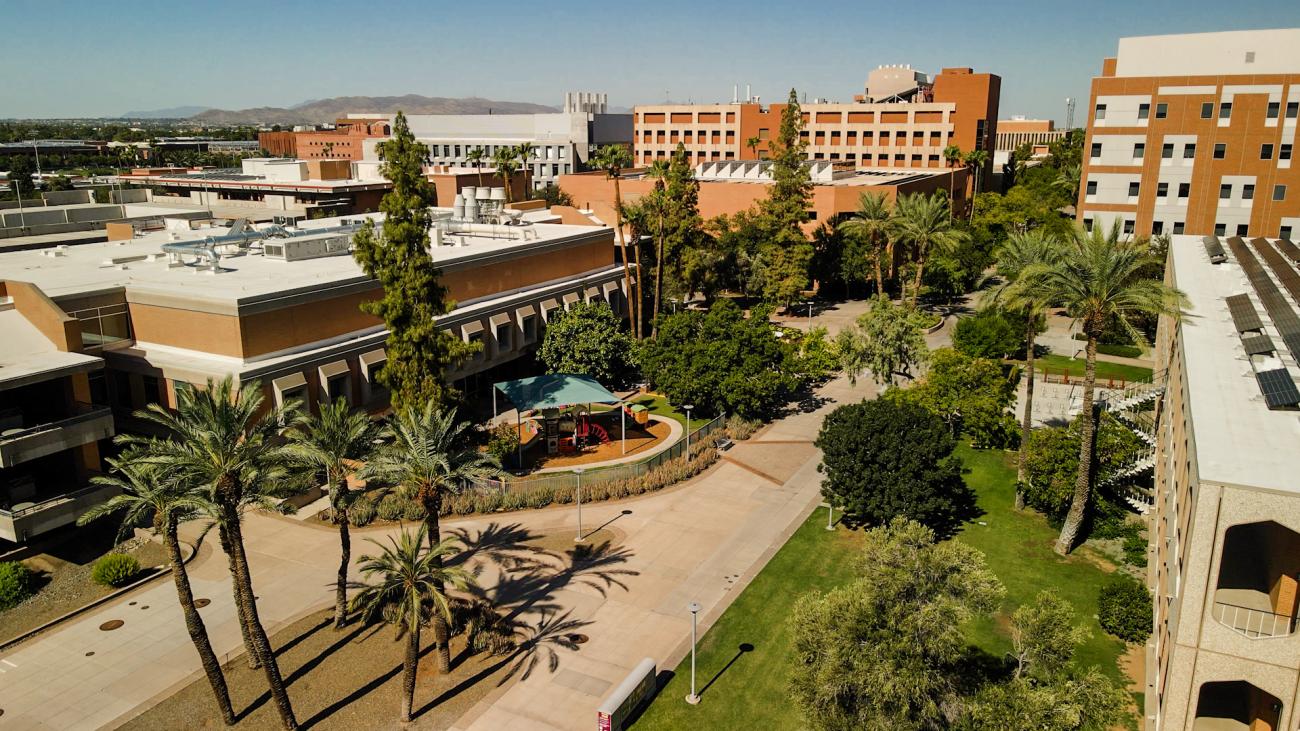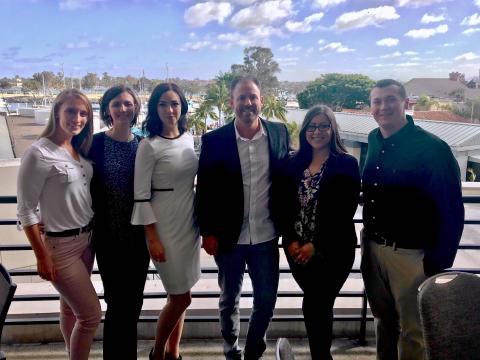
Behavioral Alcohol Research for Clinical Advancement (Corbin)

The Behavioral Alcohol Research for Clinical Advancement lab (BARCA) conducts laboratory and survey research on processes involved in alcohol-related problems including alcohol use disorders. Laboratory-based studies are conducted in a simulated bar on the Arizona State University campus, the BARCA Lounge. Participants are administered alcohol and then observed in this quasi-naturalistic setting. Survey studies are designed to track drinking and other risky behaviors longitudinally to identify risk and protective factors for the development of related problems. The goal of both types of studies is to better inform prevention and intervention efforts. The BARCA lab will continue to apply the knowledge gained through experimental and longitudinal studies to the prevention and treatment of addictive behaviors.
The focus of BARCA's research is on factors that contribute to the development of alcohol related problems in adolescents and young adults. Substance use disorders are now the third most common psychiatric diagnosis, trailing only mood and anxiety disorders in prevalence in the general population. In addition, heavy alcohol use contributes to a host of high-risk behaviors with their own associated costs. Examples include unprotected sexual behavior that increases risk for HIV/AIDS, other drug use, problem gambling, and driving under the influence, which is responsible for a large proportion of traffic-related fatalities. The goals of Dr. Corbin's research are to improve our understanding of factors that lead to the development of alcohol related problems; and to develop effective programs for reducing alcohol-related harm in adolescents and young adults. The first research aim is met through a combination of a) longitudinal survey research on risk factors for heavy drinking and engagement in other risk behaviors (e.g. high risk sexual behavior, gambling), b) laboratory-based research on the relation between subjective response to alcohol and risk for alcohol-related problems, and c) laboratory-based research on the effects of alcohol on basic cognitive processes, decision making, and risk-taking. The second aim is met through prevention outcome studies targeting alcohol use and associated risk behaviors.
Current Projects
Current Projects
Reducing Alcohol-Related Sexual Risk Behavior (R34 with Dr. Thresa Treat). This study aims to target the interface of alcohol and sexual behavior with an integrated combination of cognitive training and motivational strategies. It involves examination of the effects of a prevention program and longitudinal tracking of subsequent real-world behavior.
Contextual Influences on Alcohol Response and its Relation to Drinking Outcomes (NIAAA R01). This project is designed to comprehensively assess alcohol response across multiple settings, including those that are more representative of real-world drinking contexts. Findings will facilitate the development of prevention programs that target unique patterns of response to alcohol across contexts.
Opioid Project. This project aims to assess the effect of initial dosing on medication-assisted treatment outcomes for individuals with opioid use disorder. Findings will inform the best procedures to improve retention and medication stability. This project works with a community treatment provider focused on medication-assisted treatment for opioid use disorder.
Acute Stress and Drinking in Middle-aged adults (IMHR). This study aims to examine relations between stress, drinking context, and alcohol consumption in middle-aged adults. It involves the use of ecological momentary assessment data to assess stress and alcohol-related problems in an understudied population.
Past Projects
Promotive and Protective Factors for Alcohol Use and Problems in Emerging Adults (NIAAA R21; September 2013 – August 2016). This project involves secondary data analyses to identify major classes of promotive/protective factors against heavy drinking and related problems in emerging adults. The results of these analyses will be used to develop a novel prevention program to bolster promotive/protective influences in incoming college students. We are currently evaluating the efficacy of this new program for students enrolled in PSY 191 at Arizona State University.
Genetic Mechanisms of Change in Trajectories of Drinking and Other Deviant Behaviors (with Dr. Kim Fromme; NIAAA R01; September 2012 – June 2019). The goals of this project are to collect survey and DNA data from an existing longitudinal sample to test the genetic mechanisms underlying different trajectories of drinking and other behavioral risks. Specifically, we are testing generalized deviance and subjective response to alcohol as distinct mechanisms through which genetic factors operate.
ASU Support for Success Initiative for Students in Transition to College (ASSIST-C) (with Drs. Leah Doane, Thao Ha, and the Office of Educational Outreach and Student Services). In collaboration with ASU professional staff, the ASU research faculty formulated a strengths-based curriculum for youth and parents that was offered to a random subset of incoming 2015 ASU students and their families. The program included modules on goal setting, academic engagement, peer relationships, romantic relationships, health behaviors, and emotional health. Data collection is now complete and we are currently evaluating the outcomes of the program.
Trait and state ECF deficits under alcohol: Developmental paths to alcohol misuse (submitted to NIAAA for review; with Drs. Laurie Chassin and Madeline Meier). This project examines both state and trait executive cognitive functions (ECF) and acute tolerance alcohol effects as potential mechanisms through which a family history of alcoholism contributes to risk for alcohol-related problems. The project brings together a rich three-generation longitudinal study of family history, an alcohol challenge, and retinal imaging to address this important research question.
Anxiety and Subjective Response to Alcohol: Moderating Effects of Drinking Context and Mediation by Cortisol Response to Alcohol. This study aims to understand the nature of relations among anxiety symptoms, physiological response to alcohol (specifically, changes in salivary cortisol levels in response to alcohol) and subjective response to alcohol. Analyses will also address the extent to which drinking context impacts relations among these variables.
Multidimensional Assessment of Self-Control (MASC) measurement development. Several studies sought to create a new brief survey measure of top-down self-control that differentiates between self-control perceived capacity, internal motivation, and external motivation. The three subscales uniquely related to various self-reported behavioral outcomes and accounted for additional variance beyond that accounted for by a widely used measure of self-control (BSCS; Tangney, Baumeister, & Boone, 2004). Future studies are needed to establish the stability of multiple dimensions of self-control, their ability to prospectively predict health risk and protective behavior, and to develop state-like and domain-specific measures of self-control. Currently, we are conducting a laboratory-based study of this measure as it relates to executive cognitive function (ECF) and behavior.
Survey of Local Substance Use Treatment Centers. This study aims to create a database of local substance use treatment centers for the community. The goal is for this database to contain information about the types of treatments that are available so that those seeking treatment can easily access important information about available resources to facilitate their decision-making.
Development of a novel retrospective measure of early alcohol exposure. This project seeks to validate a comprehensive alcohol consumption measure that gathers detailed early drinking information. This measure has the potential to yield a variety of different alcohol consumption indices along with drinking trajectories across adolescence and young adulthood. Preliminary studies suggest this measure predicts concurrent and future alcohol-related problems over and above other common alcohol consumption measures.
Lab Director and Principal Investigator: William R. Corbin, PhD, Professor of Psychology and Director of Clinical Training
Dr. Corbin is a Professor and Director of Clinical Training within the Department of Psychology at ASU. His research is well funded by the National Institute on Alcohol Abuse and Alcoholism and focuses on understanding factors that contribute to the development of alcohol related problems in adolescents and young adults. Using both survey and lab based studies, Dr. Corbin’s work is designed to provide new insights into the etiology of alcohol use and abuse. This work directly informs the development and evaluation of prevention and intervention approaches targeting alcohol-related problems. Dr. Corbin recently completed work on a randomized clinical trial examining the effects of naltrexone on heavy drinking young adults, and he is actively involved in the development of two novel alcohol prevention programs targeting young adults during the transition from high school to college. Curriculum Vitae.
Lab Staff
Lab Coordinator: Cody Schwartz
Current Graduate Students
Scott King
Scott’s primary areas of research focus on understanding individual risk factors for high-risk alcohol use and negative alcohol-related consequences. More specifically, he is interested in understanding how drinking motives, drinking context, and subjective response to alcohol uniquely contribute to heightened alcohol-related risk. He has recently started collecting ecological momentary assessment data to examine dynamic relations between drinking motives, affect, and craving across a drinking episode.
Abigail McDonald
Abigail McDonald is a graduate student in clinical psychology working with Dr. Will Corbin. Abigail’s research focuses on individual risk factors for comorbid substance use and internalizing disorders. She is also interested in the co-use of alcohol and cannabis with stimulants. She is currently working on a project examining the interaction between negative urgency and internalizing symptoms on coping motives and alcohol problems.
Current Undergrad Research Assistants
Rishika Shah
Rishika is a senior at Barrett, The Honors College at ASU pursuing a B.S. in Psychology. She has been an undergraduate research assistant at the BARCA lab since Fall 2021. She is interested in cannabis and alcohol use patterns and predictors and has worked on an EMA study to examine subjective responses to cannabis use with the lab. Her other research interests include mental health challenges and cognitive impairment in at-risk groups such as military members, older adults and racial minorities. She plans to pursue a PhD in Clinical Psychology to further her research in substance use in vulnerable populations. Rishika is the president of the Psychology Engagement Team and the secretary of Psych For All diversity-initiative at ASU. In her free time, Rishika enjoys traveling, trying out different cuisines and Yoga!
Anabelle Alderfer
Anabelle is a Junior at Arizona State University and an undergraduate research assistant at the BARCA Lab. She is pursuing a B.A. in Psychology and a minor in Business, and plans to earn a PhD in Clinical Psychology after graduation in December of 2023. Anabelle’s research interests include substance use, coping motives, negative urgency, and depression. Anabelle’s free time usually consists of creative writing, reading, going to the gym, and spending time with family and friends
Annie Cooper
Annie is a senior at ASU pursuing a Bachelor of Arts in Psychology. Annie currently serves as chapter president of Psi Chi, the International Honor’s Society within Psychology, and plans to earn a PhD in Cognitive Science. Her general research interests are identifying risk and protective factors for the development of alcohol-related problems as well as the associations between anxiety and depression on AUD.
Xavier Rollier
Xavier is a junior majoring in Psychology and minoring in kinesiology. After he graduates in May 2024, he wants to go to grad school to become a physical therapist and work in a children’s hospital. He is also interested in the ways multi-racial persons drink and how their environment affects alcohol use. In his free time, he enjoys playing baseball, skateboarding, and hanging out with friends.
Ricardo Woods-Gonzalez
Ricardo Woods-Gonzalez (He/Him) is a Senior at Barrett and an undergraduate research assistant at the BARCA Lab. He is pursuing a B.S. in Psychology and intends on continuing his education with a Ph.D. in Clinical Psychology. Ricardo has research interests in substance use as it relates to the onset and perpetuation of mood disorders and the adaptation of psychometric measures for different cultures/populations. Ricardo is currently preparing a poster on impulsivity and alcohol use disorder to present at the 2022 ABCT conference. In his free time, Ricardo enjoys reading and playing the guitar.
Mason A. Brewer
Mason is a senior undergraduate pursuing Psychology (B.S.) with minors in Philosophy and Religious Studies. He is an undergraduate Research Assistant with the BARCA Lab and works with Dr. Corbin in recruitment, data collection, and national archiving for the Reducing Alcohol-Related Sexual Risk Behavior Prevention Grant. He is also preparing a poster on a latent-profile analysis of alcohol use and risky sexual behavior for presentation at the Arizona Psychological Association Annual Convention. Additionally, Mason is currently the Finance Director for the Psychology Engagement Team at ASU Tempe, a Teaching Assistant at ASU West, and an Account Manager with Education At Work. Some of his previous professional experiences include a Crisis Response internship with City of Tempe CARE 7 and training in Disaster Mental Health Services with American Red Cross. Mason will be pursuing a doctoral degree in Clinical Psychology after his graduation in May of 2023, and his general research interests include psychopharmacology, substance abuse, personality assessment, and anxiety and depressive disorders.
Lab Alums - Where are they now?
Former Doctoral Students:
Kyle Menary, PhD, Consultant, Boston Consulting Group
Stephen Boyd, PhD, Assistant Professor, Oregon Health Sciences University
Jessica M. Cronce, PhD, Assistant Professor, University of Oregon
Meghan Morean, PhD, Assistant Professor, Oberlin College
Ashley Gearhardt, PhD, Assistant Professor, University of Michigan
Caitlin Scott Gallegos, PhD, Clinical Psychologist, New Mexico VA Healthcare System
Former Post-doctoral Fellows:
Ellen Vaughan, PhD, Associate Professor, Indiana University
Derek Iwamoto, PhD, Assistant Professor, Department of Psychology, University of Maryland
Affiliated Faculty
Julie Patock-Peckham, PhD, Assistant Research Professor, ASU Department of Psychology
Select Publications
Below are a sample of recent publications from Dr. Corbin's research and lab. A more complete listing may be found in Dr. Corbin's curriculum vitae. Student co-authors appear with an asterisk*.
In press
Boyd, S. B., & Corbin, W.R. (In press). Faster alcohol metabolism is associated with increased stimulation and within session consumption. Experimental and Clinical Psychopharmacology.
2016
*Menary, K.R., Corbin, W.R., & Chassin, L. (2017). Associations between early internalizing symptoms and speed of transition through stages of alcohol involvement. Development and Psychopathology, 29, 1455-1467.
Boyd, S. J., Corbin, W. R., Morean, M. E., & Martin, C. S. (2017). Alcohol stimulation and sedation: A critical review of the biphasic alcohol effects scale. Current Addiction Reports, 4, 209-220.
Corbin, W. R. & Cronce, J. M. (2017). Effects of alcohol, initial gambling outcomes, impulsivity, and gambling cognitions on gambling behavior using a video poker task. Experimental and Clinical Psychopharmacology, 25, 175-185.
Corbin, W.R., Scott, C.J., & Treat, T.A. (2016). Sociosexual attitudes, sociosexual behaviors, and alcohol use. Journal of Studies on Alcohol and Drugs, 77, 629-637.
*Gates, J.R., Corbin, W.R., & Fromme, K. (2016). Emerging adult identity development, alcohol use, and alcohol-related problems during the transition out of college. Psychology of Addictive Behaviors, 30, 345-355.
2015
Carlson, M., Harden, K.P., Kretsch, N., Corbin, W.R., & Fromme, K. (2015). Interactions between DRD4 and developmentally specific environments in alcohol dependence symptoms: Attempt to replicate Park et al. (2011). Journal of Abnormal Psychology, 124, 1043-1049.
Corbin, W.R., Papova, A., Morean, M.E., O’Malley, S.S., Krishnan-Sarin, S., Abi-Dargham, A., Anticevic, A., Pearlson, G., Petrakis, I., Pittman, B.P., & Krystal, J.H. (2015). Integrating Acquired Preparedness and Dual Process models of risk for heavy drinking and related problems. Psychology of Addictive Behaviors, 29, 864-874.
Corbin, W.R., Scott, C.S., Boyd, S.J., Menary, K.R., & Ender, C.K. (2015). Contextual influences on subjective and behavioral response to alcohol. Experimental and Clinical Psychopharmacology, 23, 59-70.
*Hartman, J.D., Patcok-Peckham, J.A., Corbin, W.R., Gates, J.R., Leeman, R.F., Luk, J.W., & King, K.M. (2015). Direct and indirect links between parenting styles, self-concealment (secrets), impaired control over drinking and alcohol-related outcomes. Addictive Behaviors, 40, 102-108.
*Menary, K.R., Corbin, W.R., Leeman, R.F., Fucito, L.M., Toll, B.A., DeMartini, K., & O’Malley, S.S. (2015). Interactive and indirect effects of anxiety and negative urgency on alcohol-related problems. Alcoholism: Clinical and Experimental Research, 39, 1267-1274.
O’Malley, S.S., Corbin, W.R., Leeman, R.F., DeMartini, K.S., Fucito, L.M., Ikomi, J., Romano, D.M., Wu, R., Toll, B.A., Sher, K.J., Gueorguieva, R., & Kranzler, H.R. (2015). Reduction in alcohol drinking in young adults by naltrexone: A double-blind, placebo-controlled, randomized clinical trial of efficacy and safety. Journal of Clinical Psychiatry, 76, e207-e213.
2014
*Boyd, S.J., Corbin, W.R., & Fromme, K. (2014). Parental and peer influences on alcohol use during the transition out of college. Psychology of Addictive Behaviors, 28, 960-968.
Corbin, W.R., Zalewski, S., Leeman, R.F., Toll, B.A., Fucito, L.M., & O’Malley, S.S. (2014). In with the old and out with the new? A comparison of the old and new binge drinking standards. Alcoholism: Clinical and Experimental Research, 38, 2657-2663.
Iwamoto, D.K., Corbin, W.R., Takamatsu, S., & Castellanos, J. (2014). College men and alcohol use: Positive alcohol expectancies as a mediator between distinct masculine norms and alcohol use. Psychology of Men & Masculinity, 15, 29-39.
*Scott, C.S., & Corbin, W.R. (2014). Influence of sensation seeking on response to alcohol versus placebo: Implications for the Acquired Preparedness Model. Journal of Studies on Alcohol and Drugs, 75, 136-144.
2013
*Morean, M.E., Corbin, W.R., & Treat, T.A. (2013). The Subjective Effects of Alcohol Scale: Development and psychometric evaluation of a novel assessment tool for measuring subjective response to alcohol. Psychological Assessment, 25, 780-795.
News & more!
The BARCA lab presented a symposium titled “Innovative Scientific Approaches for Identifying Novel Targets of Prevention of Alcohol-Related Sexual Aggression” at the 41st Annual Research Society on Alcoholism Scientific Meeting in June 2018 (abstract).
Jessica Hartman defended her Master’s project titled “The Comprehensive Early Drinking History Form: A Novel Measure of Early Alcohol Exposure” in August 2017. This project focused on the development of a retrospective measure, geared towards adolescents and young adults, that gathers detailed early drinking information. She received her M.A. in December 2017 and this manuscript is in submission for publication. Currently Jessica is working on preparing her Comprehensive Exams which she will be defending in Fall 2018.
Anna Papova passed her comprehensive exams in October 2017 and is currently setting up her dissertation study titled “Experimental Manipulation of Motivation and Self-Efficacy for Self-Control.” This study will examine a multidimensional self-control survey measure as it compares to laboratory executive cognitive function tasks and consumptive behavior.
In collaboration with Drs. Tom Dishion, Leah Doane, Thao Ha and the Office of Educational Outreach and Student Services, we recently launched a new parent-based prevention program, ASSIST-C, to facilitate successful transitions into college for new freshmen.
Dr. Corbin was appointed as a standing member of the Addictions Risk and Mechanisms Study Section of the National Institutes of Health (NIH).
The BARCA lab presented a symposium titled “Positive and Negative Urgency Predict Craving and Subjective Response in a Placebo-Controlled Alcohol Challenge” at the 39th Annual Research Society on Alcoholism Scientific Meeting in June 2016 (abstract).
Kyle Menary submitted a proposal to the National Institute on Alcohol Abuse and Alcoholism (NIAAA) as a National Research Service Award (NRSA). The application was successfully funded, and the project will run through September of 2018. The study aims to understand the nature of relations among anxiety symptoms, physiological response to alcohol (specifically, changes in salivary cortisol levels in response to alcohol) and subjective response to alcohol.
Dr. Corbin was promoted to Professor and appointed to the Board of Directors of both the Research Society on Alcoholism and the Council of University Directors of Clinical Psychology.
Several research assistants in the BARCA lab have been accepted into graduate programs in the past few years including Kailey Richner, Jessica Canning, and Angela Harrid.

